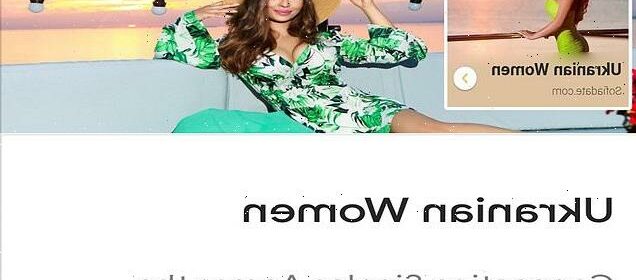Dating adverts offering chance to Ukrainian women are banned

Dating adverts offering chance to meet ‘lonely’ Ukrainian women are banned as watchdog says they ‘highlight vulnerability and connect it to sexual appeal’
- Ads to meet ‘lonely’ Ukrainian women were banned by advertising authority
- SofiaDate started ads as scheme to get public to house refugees was launched
- After complaints it was deemed inappropriate and offensive in light of the war
Online dating ads have been banned for serious offence after offering the chance to meet ‘lonely’ Ukrainian women amid the invasion of the sovereign state by Russia.
The Advertising Standards Authority (ASA) said the three ads from SofiaDate, seen in May, which featured models dressed in low-cut and body-hugging clothing, connected the women’s vulnerability to their sex appeal.
It was the same month that the Government launched a scheme to encourage the public to house Ukrainian refugees.
The advertisements were promoted by local newspapers and saw a blonde woman on a balcony in a skimpy yellow dress which publisher Newsquest acknowledged were ‘clumsily sexist’ but not unsympathetic towards Ukrainian women.
But the news group said on reflection the ads had been removed as they could have been inconsistent with their policy on refusing ads for prostitution and trafficking.
Predatory men were also found, according to another investigation, to be exploiting the Homes for Ukraine refugee scheme to host single and vulnerable women fleeing Putin’s war.
The second and third ads, both seen on Scottish newspaper The National’s website, featured images of women and said: ‘Ukrainian Women’
Three complaints lodged with the ASA said the ads were inappropriate and offensive in the context of the war in Ukraine.
Astrasoft Projects, trading as SofiaDate, said it had also removed the ads.
The first ad, seen on the Dorset Echo’s website, stated: ‘Ukrainian [sic] women. [You can] meet thousands of lonely Ukrainian Women. Forget About Loneliness. Let Yourself be Happy.’
The second and third ads, both seen on Scottish newspaper The National’s website, featured images of women and said: ‘Ukranian [sic] Women’ and ‘Connecting Singles Across the World to Their Ideal Partner … ‘
The National and Newsquest Media Group, trading as Dorset Echo, said the ads were ‘ostensibly conventional dating ads, although potentially clumsily sexist in their portrayal of women from a male perspective’.
They argued the ads did not refer to the war in Ukraine, were not partisan, and were also not unsympathetic towards Ukrainian women or the Ukrainian people in general.
However, they said that on reflection they could be inconsistent with their policy of refusing ads for prostitution and trafficking, and confirmed they had since been removed.
The first ad, seen on the Dorset Echo’s website, featured an image of a woman on a balcony
Upholding the complaints, the ASA said the women depicted in the ads were shown in a way that was, at least partly, designed to titillate readers, with the models dressed in low-cut and body-hugging clothing.
The watchdog said: ‘We considered the ads’ focus on Ukrainian women dressed in the aforementioned manner, as well references to their loneliness, had the effect of highlighting their vulnerability and connecting it to their sexual appeal.
‘For that reason, we concluded the ads were likely to cause serious offence.’
The ads also said ‘Connecting Singles Across the World to Their Ideal Partner’
Meanwhile it was revealed in May that men with domestic abuse or violence records have reportedly messaged single Ukrainian women in their 20s and 30s on Facebook groups specially set up to connect sponsors and hosts.
Some refugees have even become homeless after relations with hosts broke down or because housing was not well vetted.
Other homes have been found to be completely unsuitable for Ukrainians escaping Russian bombs, with one mother-of-two claiming that her whole family had been expected to sleep in one small reception room next to the kitchen – despite expecting separate bedrooms.
She added that the property was filled with Nazi pictures and Soviet symbols, telling the BBC: ‘I don’t feel safe’.
It comes after the UN’s refugee agency warned in April of ‘increasing reports of Ukrainian women feeling at risk from their sponsors’. The UNHCR called for ‘the need for adequate safeguards and vetting measures to be in place against exploitation, as well as adequate support for sponsors’
Source: Read Full Article


